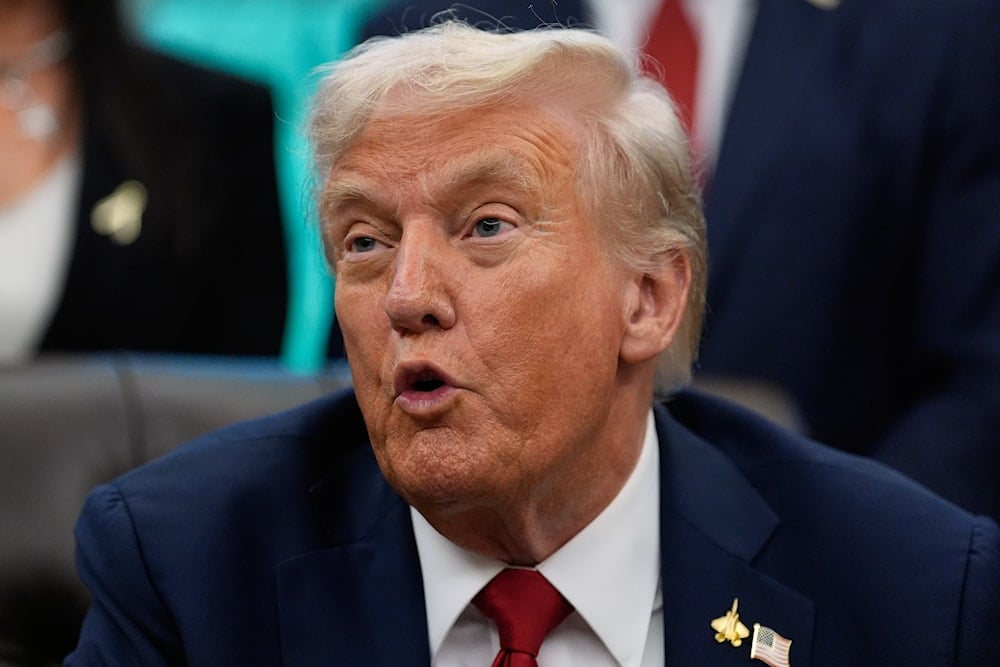Trump signs order pledging US defense of Qatar after Israeli strike
Trump's order comes after "Israel" apologized to Qatar for the strike in Doha.
-

Trump signs order pledging US defense of Qatar after Israeli strike. (AP)
United States President Donald Trump has signed an executive order vowing to use all measures, including potential military action, to defend Qatar. The order, dated Monday but made public on Wednesday on the White House website, appears aimed at reassuring Qatari officials following an Israeli missile strike that targeted Hamas leaders in Doha.
The executive order emphasizes the “close cooperation” and “shared interest” between the US and Qatar, pledging to “guarantee the security and territorial integrity of the state of Qatar against external attack.”
It declares that any armed attack on Qatari territory, sovereignty, or critical infrastructure will be treated as a threat to US peace and security.
“In the event of such an attack, the United States shall take all lawful and appropriate measures – including diplomatic, economic, and, if necessary, military – to defend the interests of the United States and of the state of Qatar and to restore peace and stability,” the text says.
Context of the Israeli strike
The order follows a September 10 Israeli missile strike in Doha targeting Hamas leaders, which killed six people, including a Qatari security officer. At the time, a delegation of Hamas' top leaders was holding a meeting to discuss a US-proposed ceasefire agreement, under Qatari mediation, but they survived the attack. During a Washington visit on Monday, Israeli Prime Minister Benjamin Netanyahu spoke with Qatari officials via a call organized by Trump, expressing “deep regret” over the incident.
Qatar’s Foreign Ministry described the US pledge as “an important step in strengthening the two countries’ close defense partnership.”
Read more: Netanyahu apologizes to Qatar over Doha strike: Axios
US-Qatar strategic ties
Qatar hosts the US Al-Udeid Air Base, the largest American military installation in the Middle East, which has been central to US regional operations, including during the Afghanistan withdrawal. Qatar was also designated a major non-NATO ally by former President Joe Biden in 2022, reflecting its strategic role in US military planning.
Trump has maintained close ties with Qatar personally and commercially, including through real estate ventures with the Trump Organization and the transfer of a Boeing 747 for presidential use. Yet, these ties did not stop Israeli decision-makers from striking civilian infrastructure in the highly valued US ally's territory.
Read more: Israeli media: US coordinated with 'Israel' in Doha Hamas attack
Legal weight, limitations
The executive order is not a treaty and does not require Senate approval, leaving some uncertainty about its enforceability. Any military action ultimately depends on the president’s discretion, echoing ambiguities seen in previous US defense commitments, including Article 5 NATO guarantees and Trump-era agreements.
While the order signals a strong political and strategic commitment, its exact scope remains unclear, raising questions about how it might interact with broader Gulf, Israeli, and other regional powers' security arrangements.
Read more: Trump to unveil Gaza post-war plan to Arab and Muslim leaders
Regional implications of Israeli attacks
The Israeli strike and subsequent US pledge may reshape security dynamics in the Gulf. Following the attack, Saudi Arabia entered a mutual defense pact with Pakistan, placing the kingdom under Islamabad’s nuclear umbrella. Analysts suggest other Gulf states may seek similar arrangements with the US or regional partners to protect against Israeli threats.
Read more: Following 'Israel's' strike on Qatar, could the next target be Turkey?

 4 Min Read
4 Min Read








